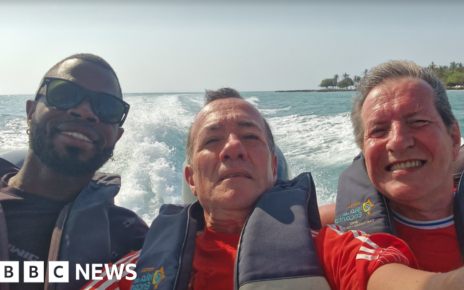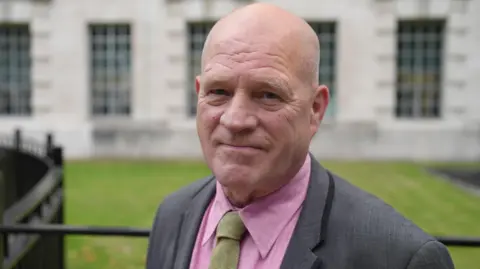 Ann Gannon / BBC
Ann Gannon / BBCLGBT veterans awarded a special badge to mark the injustice they faced say they will refuse to wear it until the government pays them compensation.
Representatives from the Army, the Royal Navy and Royal Air Force attended a ceremony in Westminster on Tuesday to receive the first of thousands of pin badges planned for those who served during 1967-2000, when it was illegal to be gay in the military.
But the group told Defence Secretary John Healey they would not wear the badges until all 49 recommendations of an independent report were enacted, including financial compensation for those affected.
The Ministry of Defence has not yet responded to a request for comment.
Homosexuality was decriminalised in the UK in 1967 but a ban continued in the armed forces.
The badge was one of the recommendations Lord Etherton, who conducted an independent review into LGBT veterans’ treatment under the ban, said the government should carry out to make reparations.
But the group told the defence secretary they were prepared to hand the badge back if the rest of the recommendations were not carried out soon.
Former soldier Stephen Close, one of the first veterans to receive the ribbon-shaped badge, at the private ceremony, in Whitehall, central London, said: “These things need to be addressed and the wrongs put right – and then I’ll be quite happy to wear the ribbon.”
He welcomed the award as “a symbol of our struggle”, Mr Close, 62, told BBC News, but the “struggle’s not over” so it was “a bit premature”.
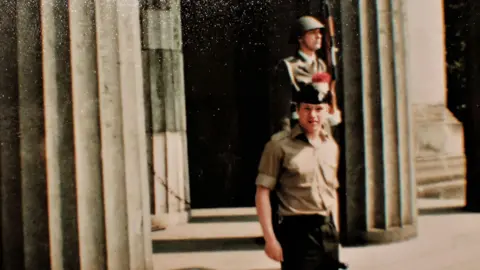 Stephen Close
Stephen CloseMr Close was dismissed from the Army after officers found out he had kissed another man while stationed in Berlin in the 1980s.
After interrogation and a “humiliating and degrading medical examination”, Mr Close was convicted of gross indecency – a sexual offence – over the kiss, discharged from the Army and sent to military prison for four months.
His convictions were disregarded in 2013, as part of a scheme in England and Wales to allow past convictions for same-sex offences that are no longer criminal to be wiped out.
But Mr Close said he had been “just a broken man” after leaving the Army.
“It wasn’t till I got back into civilian life and started looking for work that I discovered I had a convicted sex offence on my record,” he said.
“I couldn’t get any job whatsoever.”
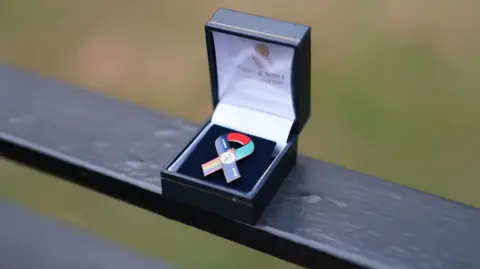 Ann Gannon / BBC
Ann Gannon / BBCThe LGBT Veterans Independent Review, led by Britain’s first openly gay judge, Lord Etherton, began in 2022 and heard about the experiences of 1,145 veterans.
It included shocking accounts of homophobia, bullying, blackmail, sexual assaults, “disgraceful” medical examinations and conversion therapy.
Lord Etherton’s report recommended compensation – capped at £50m in total – be paid to those affected by the ban.
Other recommendations included a special LGBT veterans memorial, the return of medals and berets and the clarification of pension rights.
‘Many insults’
A National Audit Office report says up to 4,000 veterans are expected to be eligible for compensation, meaning the average payout could be about £12,500.
But Mr Close said: “That wouldn’t even pay my credit-card bill.
“I was sentenced at 20 years of age.
“Right up until 50, [I had] a criminal conviction.
“I was unable to save anything – I have no pension, no savings, I’ve never been on holiday.
“I’m coming up to my retirement now and I’ve got nothing.
“They’ve offered me £12,500 for all that?
“We’ve had many, many insults… and this is just one.”
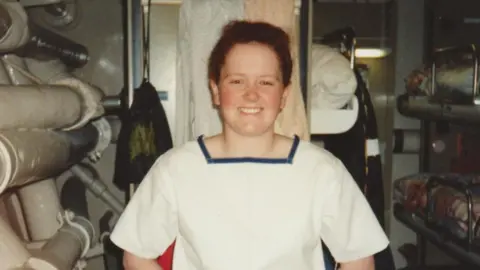 Emma Riley
Emma RileySailor Emma Riley, 52, awarded the ribbon alongside Mr Close, said: “I can’t wear this yet.
“I don’t feel it’s appropriate and right to put it on until all the recommendations from the independent review are completed – and in particular the harder ones, like the financial compensation.
“It’s the harder ones that actually are going to make the most difference to veterans who were literally destroyed – their lives are destroyed.”
Craig Jones, from campaign group Fighting with Pride, said the amount offered “risks being seen as an insult”.
“It fails to take account of the shocking treatment inflicted upon a community of veterans who defended our peace and freedom but were treated in a way which the prime minister said had brought dishonour on our nation,” he added.
Campaigners have also previously raised concerns elderly or ill veterans need compensation paid more quickly.





